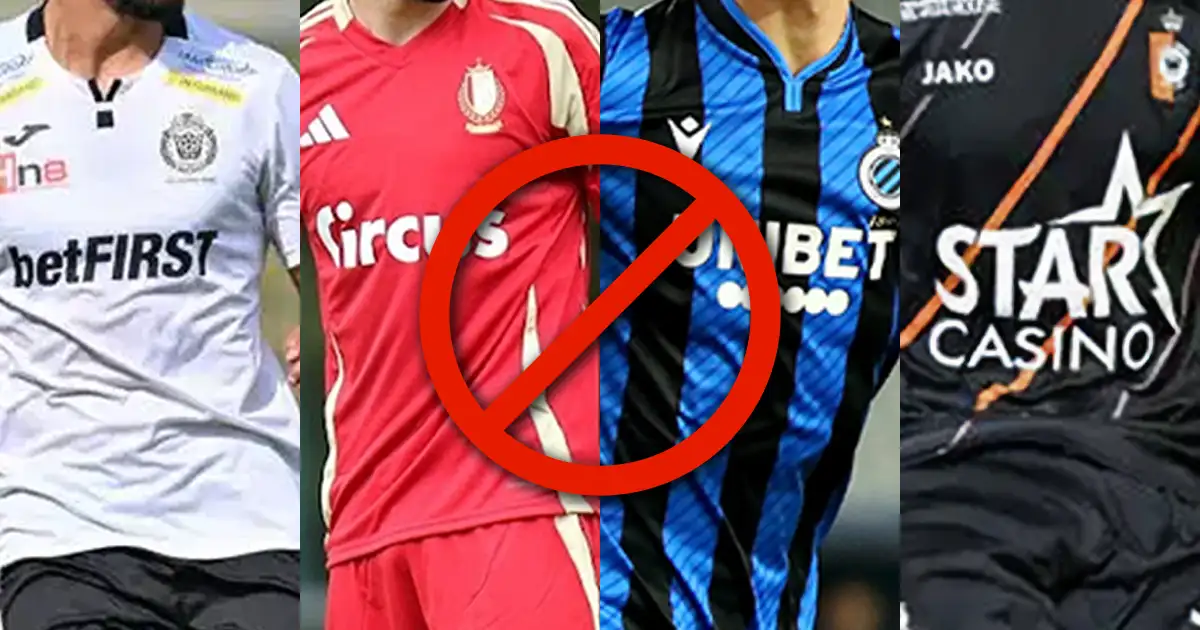Belgian football clubs try to circumvent gambling rules
Change is in the air in the Belgian football world. As of 1 January 2025, clubs will no longer be allowed to have gambling companies on their shirts. However, some clubs already seem to be thinking of ways to circumvent the rules and still raise money through gambling sponsors.
New rules aim to stop gambling advertising
The Belgian government is increasingly trying to curb gambling advertising. They mainly want to tackle the growth of gambling addiction. Under the leadership of former Minister of Justice, Vincent Van Quickenborne, several steps have already been taken in recent years. For example, gambling advertising has been banned on TV, radio, in newspapers and on websites since July 2023. Since September, footballers under the age of 21 are also no longer allowed to wear gambling advertising on their shirts.
The idea behind these measures? To protect people from the temptation of gambling. The final phase will start on 1 January 2025, when gambling advertising in stadiums will be completely banned. This means: no more gambling logos on large screens or along the pitches.
Football clubs come up with clever tricks
Despite the impending ban, football clubs are still allowed to play with gambling logos on their shirts until the end of 2027, but then on the back and much smaller than now. This is a big blow for many clubs, because gambling companies currently provide around 10 to 15 percent of the total sponsorship deals. That amounts to millions of euros per year.
Clubs such as Royal Antwerp and Beerschot are not sitting still, however. They have found a way to circumvent the rules. How? By not putting the gambling company itself on the shirt, but the name of a foundation that is financed by the gambling company. In Antwerp, for example, that foundation is called “AntwerpFirst,” which in practice is the same as their current sponsor Betfirst. A clever move, but one that goes against the spirit of the new rules.
Gaming Commission keeps an eye on things
Of course, the Gaming Commission is aware of these creative constructions and is keeping a close eye on them. The idea behind the gambling advertising ban is precisely to protect vulnerable people and to counter the normalisation of gambling. Yet these foundations ensure that gambling companies still exert their influence in sports behind the scenes.
Incidentally, these kinds of tricks are not only used in Belgium. In countries such as Great Britain and Spain, gambling companies also tried to remain involved with clubs in the same way via foundations. Bram Constandt, an expert in sports management at Ghent University, calls these practices “loopholes in the law.” And it seems that Belgian clubs are only too happy to exploit these loopholes in the law.
Gambling logos remain visible at amateur clubs
In addition to professional clubs, gambling companies are also increasingly focusing on amateur football. Sponsorship is cheaper there, but still reaches a large audience. For the time being, less strict rules apply to amateur clubs: they are still allowed to have gambling logos on their shirts, as long as the dimensions remain small.
Gambling advertisements are also increasingly being banned in the Netherlands. Since July 2023, untargeted gambling advertising has already been removed from the air there. And from 2025, all gambling advertisements, including those in sports, will be banned. This applies to both professional clubs and amateurs. Belgium is following a similar path, but is leaving amateur clubs alone for the time being.
What does the future hold?
It is clear that the gambling industry and the football world are not done with each other yet. While the government is trying to keep gambling sponsors out of sight, the clubs are looking for new ways to generate income. And let’s be honest: many clubs are largely dependent on the money of the gambling companies.
The coming years will be decisive. Will the new rules prove to be watertight? Or will the clubs, with their clever constructions, find a way to maintain the influence of gambling companies in sports?


